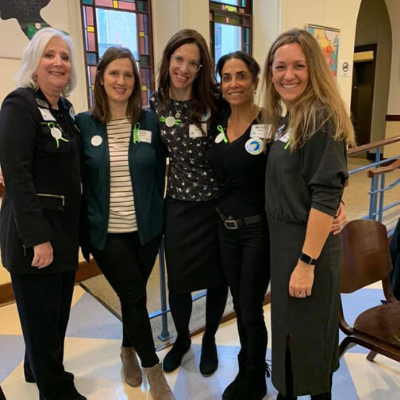By Daniel Stern
I was still a freshman at The Weber School when my older sisters suggested it was time I took part in Tikkun Olam (repairing the world). It was at this point that I decided to volunteer with Friendship Circle’s “Buddies at Home” program. I signed up and became a buddy to a young adult with special needs named Mike. Mike and I met nearly weekly, as our schedules permitted, and we had so much fun hanging out, playing sports together, going to the dog park, having lunch, and things like that. It was a great relationship.
By the time I was a sophomore, I began to think about creating a one-week summer day camp for people with disabilities modeled on Friendship Circle, where every camper has a “buddy.” I was really pumped to do it, but I did not have a plan set in stone. My mom said, “Go for it, but, remember, this is your project, not mine.” I went to the Sandy Springs Tennis Center and asked them if they’d donate a couple of tennis courts, and they said OK. I was excited to launch what I was then calling “Serve it Up” Summer Camp, but pretty soon it dawned on me that I needed a little backup. I wanted it to be a free camp to encourage all who wanted to participate to attend. I knew I needed to raise money and I knew I needed my friends to help pull this off. I launched a Go-Fund-Me campaign online that raised over $1,000 for us to get started.
I worked with Rickelle New, the Director of Friendship Circle, and I created the tennis program and she created the arts and crafts program. We developed a flyer and reached out to all of the families that had participated in Friendship Circle activities. Recruiting my friends to become buddies for our campers was the next challenge, but eventually more than 20 of my friends signed up to volunteer. It was a great success to be outside playing tennis with our special friends. So, the following summer, I was excited to create another camp. We decided to move the camp indoors to the gym at Atlanta Jewish Academy, so those who did not want to be outside all day could also participate. That summer, we played many sports in addition to tennis and still included arts and crafts. Many of our campers with special needs even had two buddies! I learned that many people with disabilities have other health issues. They can’t take the heat and need the comfort of air conditioning.
I really thought I was doing this for kids with special needs. But, when the parents of these kids came up to me and told me how much they valued the camp, it felt so good. I realized that not only did the kids benefit, but their entire families benefited from what we had created. So did my volunteers. Now, as a freshman at Vanderbilt University, with the benefit of hindsight and a little maturity, I can see I was also doing it because of the values I learned in my family, at school, and through Friendship Circle. When you help others and build real relationships, you are doing the work of tikkun olam.

 Imagine if more people re-thought mental illness as a quest for mental and spiritual wellness. Imagine if more people had the tools to understand, support, and overcome the shame, stigma, and challenges of substance abuse. Now, with support from a Federation Innovation Propel grant, Atlanta-based
Imagine if more people re-thought mental illness as a quest for mental and spiritual wellness. Imagine if more people had the tools to understand, support, and overcome the shame, stigma, and challenges of substance abuse. Now, with support from a Federation Innovation Propel grant, Atlanta-based 

